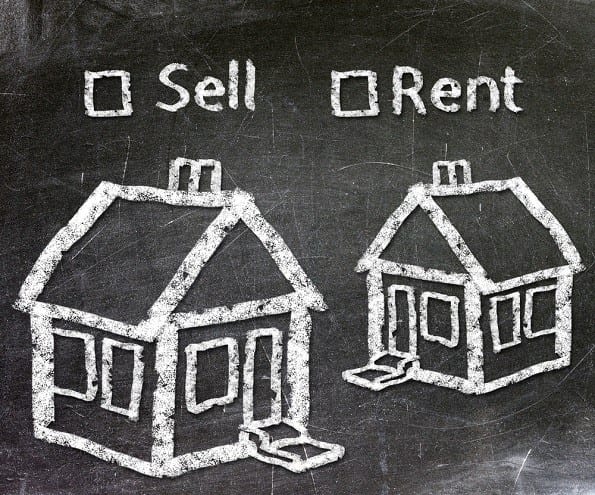Sell or Rent the Old Home?

When you no longer plan to use a house, is it better to sell or rent that residence or second home? The question faces many retirees, and even many pre-retirees.
Of course, not everyone has this choice. They need to sell the former residence or second home in order to buy the new house and maintain their standard of living. Those who have the choice, however, need to undertake a careful analysis before deciding.
The first consideration is the tax benefits from renting a home or second home instead of selling it.
When there is little or no personal use of the property by the owner, the tax law allows full tax deductions against the rental income. To qualify the home must be rented for more than 14 days during the year, and your personal use each year must be less than the greater of 14 days or 10% of the days the home is rented. Then, you can deduct mortgage interest, property taxes, and any utilities or other costs you pay related to the house. Repairs and maintenance also are deductible, but improvements are not. Any improvements are added to the tax basis.
You also get to depreciate the tax basis of the home. This is not the tax bonanza it was years ago, but it is deductible against rental income. The home (but not the land) is depreciated over either 27.5 years or 40 years, depending on the depreciation method used. For details about the tax treatment of renting a home, see IRS Publication 527.
When rental income is less than the expenses, you might be able to deduct that tax loss against other income. If your adjusted gross income is below $150,000, the loss generally is deductible against other income if you actively manage the property. When AGI is higher, the rental property is a passive activity. That’s the tax code term for a tax shelter. Then, the losses can be deducted only against income from other passive activities. Any passive losses that cannot be deducted in the current year are suspended until they can be used in the future. Details of this also are in Publication 527.
Renting the house can provide a steady stream of income that is at least partially tax sheltered. How high the income is depends on where the house is located. At today’s low interest rates, in at least some areas of the country the rental income might be greater than the interest that could be earned selling the home and investing the proceeds in bonds. In addition, the rental income probably can be increased each year. As a final benefit, the house is likely to appreciate over time.
Of course, you must be sure to estimate what the rental income would be after all expenses. You have owned homes for some time, so you know the expenses that can arise. When doing the calculations, do not forget the periodic large expenses that arise, such as replacing a roof or heating unit. Also, don’t forget that the house is not likely to be rented all the time. You might get lucky, but you should budget on the house being empty between tenants.
Don’t forget to take the intangible factors into account. Being a landlord takes some effort. There might be late night calls about plumbing or furnaces. These types of headaches can be even harder to deal with if you are an absentee landlord. In either case, you take the risk of renting to a bad tenant. The consequences of this could range from late or unpaid rent to legal fees to a neglected or damaged home.
One more factor to consider is the tax treatment from the eventual sale of the property. You have to compare the taxes due from selling the home today to the taxes from selling the home after renting it for some time. The results depend on how the home is used now.
If the home is a second home, there are no special tax benefits from selling it today. The property is a capital asset. When sold, the difference between the sale price and the basis of the property will be taxed as a capital gain. If the property was held for more than one year, the maximum tax rate will be 15%.
When a house has been rented for a few years and is a rental property, the tax treatment of a sale is similar. The difference is that depreciation allowed during the rental period reduces the tax basis of the property. That increases the eventual capital gain from the sale of the property.
If the home currently is the principal residence, however, significant tax benefits might be available from selling today.
All gain from the sale of a principal residence is tax-free up to $250,000 ($500,000 for married couples). To qualify for the exemption, you must own the home and use it as a principal residence for two of the five years preceding the sale. The ownership and residence periods do not have to be at the same time.
If you turn a principal residence into a rental home, you risk losing the exemption when the home is sold. This could be a significant tax cost if the value of the home is significantly above your cost when it is sold.
One strategy for a principal residence lets you preserve the exemption on gains. Rent the home for a few years, then sell when the gains still are eligible for the exemption. For example, you might be able to rent for two years, then put the house on the market. As long as it sells within a year, your gains will be exempt because you will have owned the home and used it as a principal residence for at least two of the preceding five years. To protect the tax-exempt gains, be sure to follow the calendar closely and be sure of the rules.
Some taxpayers with multiple homes rotate through them to qualify gains as exempt. They might initially sell the principal residence and exclude the gains from income. Then, they move into the vacation home and establish that as the new principal residence. After two years, they can sell that and exclude the gain from income. Finally, they can take the tax-free gains from the two homes and move into the retirement home of their choice.
Can you rent the principal residence while establishing the vacation home as the new principal residence, then sell both? Not likely. First, you risk exceeding the cap on tax-free gains. Second, the tax exemption is allowed only on one sale every two years.
Of course, if you decide to rent a house you don’t ever have to sell as long as you don’t need to cash in the equity. Hold the home for life, then under current law your heirs will be allowed to increase the tax basis to its current fair market value. They can sell it right away, and no one will owe capital gains taxes on the appreciation during your lifetime.
![]()





